
Malnutrition and rampant epidemics ravage northern Nigeria
In 1 click, help us spread this information :
Dr Christos Christou, President of MSF International, was visiting Borno State, Nigeria. Since September, Nigeria has been affected by severe flooding in several regions, worsening the humanitarian situation.
When I heard about the flooding that hit Maiduguri, on the top of the extreme challenges people in the region have faced for decades, I wanted to shed light on the challenges impacting people. Coming to Nigeria, I have seen why the massive flooding in Maiduguri has gained some attention worldwide - the shocking scale has affected millions of people. But it is not the only region of Nigeria affected by flooding. People in northern Nigeria have been through a lot - overwhelming levels of malnutrition, frequent outbreaks of vaccine-preventable diseases, lack of medical facilities and medical personnel; all of this has been compounded by continuous insecurity. People now have to seek temporary shelter in displacement camps once again, rebuild their homes once again, and try to figure out what’s left of their farmland. Because this flooding happened at the end of the lean season, it has deprived farmers of even the illusory hope to harvest.
During my visit to Maiduguri, I went to the hospitals and clinics where MSF works. We support the local healthcare system in tackling malaria and other diseases, as well as in providing access to maternity services. Recently, we had to launch a cholera treatment centre, after a cholera outbreak was officially declared. All this has happened in the background of a catastrophic malnutrition crisis.
One of my colleagues, a Nigerian doctor who has been working with MSF for more than eight years, told me that this year is very different. Every year, he said, during this season, we see terrible numbers of malnourished children coming to the hospital in a severe condition. But this year, at a time when the peak is supposed to be over, the number of patients admitted to the hospital is not going down. Worse, the condition in which they arrive is even more severe than usual. Very often people don’t have access even to basic medical care where they live, and do not have enough money or available transport. As a result, they reach to us too late. Now, many organisations which were providing support in Maiduguri and other parts of the north of Nigeria have had to reduce their budgets or even stop their operations. Will MSF, a non-governmental organisation relying on private donations, be able to help all who are in need? My colleague sounded really scared.
For the past few years, MSF has seen a significant increase in the number of admissions for malnutrition. The numbers in 2022 and 2023 were already critically high. But between January to August this year, we have seen a fifty-one per cent increase in admissions of children with severe malnutrition, compared to the same period last year. Over the first eight months of this year, we have treated 52,725 children with severe malnutrition, a life-threatening condition, across the whole of northern Nigeria.

On top of this, outbreaks of vaccine-preventable diseases, such as measles are recurrent in Nigeria, and one of the leading causes of death amongst children. Between January – August this year alone, we had already treated over 12,500 cases of measles. That’s nearly double the same period last year. Outbreaks of infectious diseases significantly increase mortality risks for children under the age of five. Unvaccinated children in this age group are particularly vulnerable to vaccine-preventable diseases, diseases which elevate the risk of acute malnutrition.
In addition, there is malaria. Nigeria has the highest rates of malaria in the world - accounting for nearly 27 per cent of the global malaria burden. This disease can be prevented and treated. Yet in most of the projects we see that our malaria wards are overwhelmed, and children continue to die from it.
We all clearly see that the scale of the humanitarian crises is devastating. We need to see intensified lifesaving care for malnutrition, with a focus on preventive programmes to act before children become critically ill. Enhancing vaccination coverage requires routine immunisation services, with sustained investment from the authorities to maintain basic health care, alongside catch-up campaigns that extend to children under five.

The humanitarian community faces a lot of challenges globally, with the magnitude of emergencies exceeding all imaginable quantities and scale. But in Nigeria thousands of families have just lost their crops. They already lack access to basic health care and have been struggling for survival for many years. The humanitarian community needs to act and to provide necessary support now. This is not the time to relent, this is not the time to stop. We have to help the people who need assistance now.

